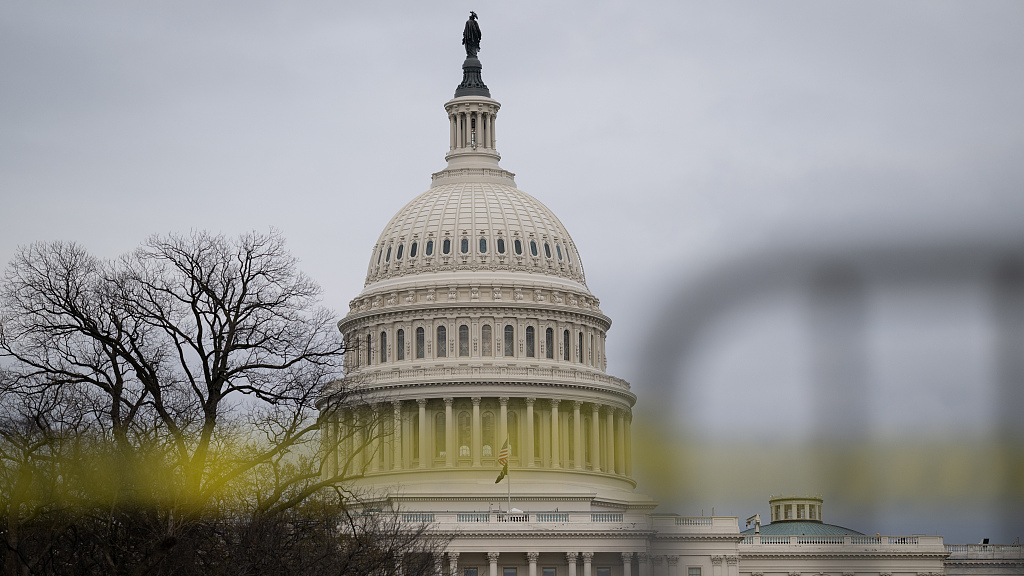
The U.S. Capitol Building, in Washington, D.C., U.S., April 6, 2022. /VCG
The U.S. Capitol Building, in Washington, D.C., U.S., April 6, 2022. /VCG
Editor's note: Bradley Blankenship is a Prague-based American journalist, political analyst and freelance reporter. The article reflects the author's opinions and not necessarily the views of CGTN.
April 12 saw another example of U.S. President Joe Biden's "moral outrage" – except this time it wasn't a gaffe. Speaking to reporters in Iowa, Biden said that Russia was committing "genocide" in Ukraine.
"Yes, I called it genocide," Biden said in response to a charge he made without elaboration at an event. "It's become clearer and clearer that Putin is just trying to wipe out the idea of even being a Ukrainian."
This is crucial wording that would mark a significant change in U.S. policy because the U.S. is party to an international convention that requires countries to intervene when genocide is formally declared. According to the Convention on the Prevention and Punishment of the Crime of Genocide (CPPCG), a United Nations treaty that the U.S. is part of, genocide is defined as actions done with the "intent to destroy, in whole or in part, a national, ethnic, racial or religious group."
Previously, Biden said he did not believe Russia's actions were genocide, but rather "war crimes." However, that stance has seemingly changed and Biden said it would now be up to lawyers to determine whether it's the case or not – though, in his opinion, "it sure seems that way."
For his part, Ukrainian President Volodymyr Zelenskyy praised Biden's categorization. Zelenskyy, who has been pushing for a greater Western role in the conflict, said on Twitter, "Calling things by their names is essential to stand up to evil. We are grateful for U.S. assistance provided so far and we urgently need more heavy weapons to prevent further Russian atrocities."
There is no doubt that what's happening in Ukraine is a tragedy. The saying goes that "war is hell," which I assume is probably the experience of anyone who has ever had the misfortune to live through it. But that is far different from genocide.

U.S. President Joe Biden delivers a speech in Menlo, Iowa, April 12, 2022. /VCG
U.S. President Joe Biden delivers a speech in Menlo, Iowa, April 12, 2022. /VCG
This is not only, again, because it would legally require the U.S. and probably its allies to intervene in the conflict in Ukraine, but also because throwing the word "genocide" around without substantial evidence makes a mockery of the entire concept. Genocide is a legal term in this context with a highly specific meaning, carrying a high burden of proof. It is not something that describes war or even war crimes and, if that were the case, this would be a very slippery slope for Washington.
That's because the United States is the world's leader in war and war crimes. The U.S. has been at war for the vast majority of its existence and has been in continual war during its modern iteration, having just recently wrapped up a 20-year occupation in Afghanistan fraught with extraordinarily well-documented war crimes and countless civilian deaths.
There's also the fact that Biden's words legitimize Kyiv's "total defense" strategy that, according to Zelenskyy's own adviser, skirts international humanitarian law and the laws of war. This strategy has, according to the Washington Post, seen Ukraine "placing heavy military equipment and other fortifications in civilian zones," which (quoting experts) "could weaken Western and Ukrainian efforts to hold Russia legally culpable for possible war crimes."
On top of this, it is irresponsible for the U.S. president to level these charges without a thorough investigation since it would legally obligate the U.S. to intervene in the situation in Ukraine. If "genocide" was formally declared by the U.S. in Ukraine and the U.S. lived up to its obligations, this would possibly see the world's two foremost nuclear powers engaged in a hot war, which has the potential to end in terminal nuclear conflict.
This is a situation that is desirable for no one and could endanger life on the entire planet, rendering the point of the intervention pointless in the first place. That is to say that if saving Ukrainian (or any) lives is the goal, then a U.S. intervention would be the last thing one should advocate for.
(If you want to contribute and have specific expertise, please contact us at opinions@cgtn.com. Follow @thouse_opinions on Twitter to discover the latest commentaries on CGTN Opinion Section.)

